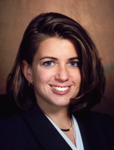Network of Trial Law Firms: What Keeps Clients Up and Night
 I'm at the Network of Trial Law Firms conference in Naples, FL, where 67 defense litigators are meeting at the Ritz-Carlton with 67 GCs and In-house counsel. Jessalyn H. Zeigler, a partner with Bass, Berry & Sims, led a key program on "What keeps In-house counsel up at night" - and there 4 things:
I'm at the Network of Trial Law Firms conference in Naples, FL, where 67 defense litigators are meeting at the Ritz-Carlton with 67 GCs and In-house counsel. Jessalyn H. Zeigler, a partner with Bass, Berry & Sims, led a key program on "What keeps In-house counsel up at night" - and there 4 things:
- E-Discovery. "It's involved in all our cases, and the technology is changing -- one day we're dealing with backup tapes and the next day we're dealing with cloud computing," said Sue Dyer, Senior Litigation Counsel of HCA in Nashville. "If you don’t get it right, your company and its executives and the lawyers can be sanctioned."
She added, "Cost control specifically keeps me up at night and e-discovery is a cost. We try to reduce the amount of data that goes to the vendor for processing. A large part of the cost is reviewing the data and therefore we use contract lawyers."
- Government actions that impact the company. "Our fear is that an EEOC investigator will show up to investigate one issue and they find something else that they consider a violation," Chris Shaheen, Vice President and Chief Litigation Counsel for U.S. Bank in Minneapolis. Agencies that keep GCs up at night include OSHA, HUD and the Department of Justice (Foreign Corrupt Practices Act).
- Costly caseload management in a tight economy. GCs are managing more cases with fewer in-house lawyers. They don’t want an invoice for overstaffing or work that wasn’t necessary, but they do want effective and timely communication with outside counsel to track the progress of progress of cases.
"I don’t want a phone call from our CEO who is asking about something that went off the rails and we couldn’t warn our executives ahead of time, or a small case that turned into a big case that wasn’t on our radar," said Karen Abbott, Associate General Counsel of IASIS Healthcare in Franklin, TN.
- Social media and the impact of Facebook, Twitter on the company and its brand. "Ten years ago it was easy to have one spokesman for the company, but now almost everybody has a Facebook account, and many have a Twitter account. Anybody can get online and put something online, permanently, about the company," said Livingson J. Johnson, GC of Coca-Cola Company in Atlanta, GA.
"We have social media guidelines, recognizing that people will be online and we have a code of business conduct. Our associates understand they can have Facebook page, but if they’re going to talk about the company, they have to go through training and respect our brand,"
The conference exemplifies the best of law firm marketing and business development.
 Lawyers are providing value to the GC attendees and spending time face-to-face with them. In addition to giving the clients free CLE, the lawyers are spending recreational time with the GCs golfing, biking and kayaking at a lovely Ritz-Carlton Hotel. The attorneys are also spending time with each other, referring files back and forth and building each other's practices. One lawyer closed a piece of new business on the limo ride from the airport with a GC.
Lawyers are providing value to the GC attendees and spending time face-to-face with them. In addition to giving the clients free CLE, the lawyers are spending recreational time with the GCs golfing, biking and kayaking at a lovely Ritz-Carlton Hotel. The attorneys are also spending time with each other, referring files back and forth and building each other's practices. One lawyer closed a piece of new business on the limo ride from the airport with a GC.
The lawyers have been doing all this since 1993, as pointed out by network Chairman Tony Lathrop, a partner at Moore & Van Allen. This is the 50th conference of the network, which includes 7,000 Attorneys in 25 trial law firms in more than 140 offices in the U.S. and Canada.
The network offers free CLE based on conference speeches online at www.trial.com/cle. For example, the YouTube video of John Fitzpatrick was recently viewed by a top executive of a New York financial services company. "This is exactly what we had in mind when we developed the Network's free one-of-a-kind online streaming video CLE. The potential for new business flowing from this unique capability is unimaginable," said Ellis Mirsky, the network's Executive Director and General Counsel.



